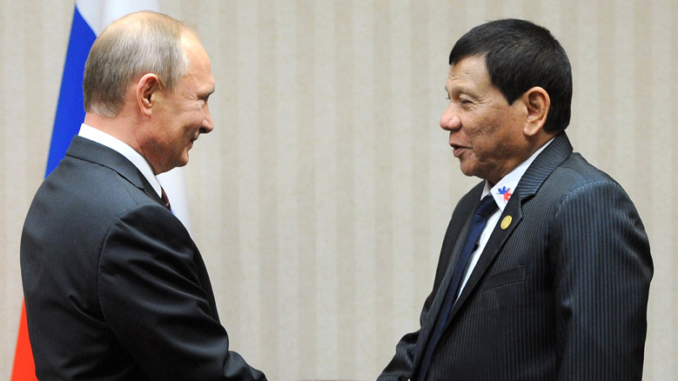
On Tuesday, Philippine Foreign Secretary Alan Peter Cayetano, acting under the orders of President Rodrigo Duterte, warned Chinese officials on a number of issues which, he said, contained “red lines” which would trigger war.
From the South China Morning Post:
“Nobody can extract natural resources there on their own,” Cayetano said. “The president has declared that. If anyone gets the natural resources in the West Philippine Sea-South China Sea, he will go to war.”
Among the potential triggers are construction on a disputed shoal and unilateral extraction of gas and oil resources. This marks an official deviation from recent policy decisions of Duterte, who in 2016 shifted the former American territory firmly away from its long history of positive relations with the US and toward China and Russia. During his visit to Bejing in 2016, Duterte said: (Reuters)
“In this venue, your honors, in this venue, I announce my separation from the United States,” Duterte told Chinese and Philippine business people, to applause, at a forum in the Great Hall of the People attended by Chinese Vice Premier Zhang Gaoli.
“Both in military, not maybe social, but economics also. America has lost.”
This was, in some ways, to be expected. Duterte had received warnings and condemnations in diplomatic circles for his handling of the drug addiction crisis in the Philippines, and had favored an authoritarian approach of killing criminals for drug offenses, often without trials. Criminals, in this case, are defined both as drug dealers and drug users, and political dissidents have been named as drug criminals and murdered for their positions. The current estimates of the dead are known to be in excess of 12,000 but may be up to double that amount, due to inaccurate governmental reporting. (Human Rights Watch)
President Trump attempted to re-align Duterte with the United States following Duterte’s re-election in May, 2017. Despite allegations of voter intimidation, Trump congratulated Duterte on his election victory and congratulated his work on ending the Philippines drug problem. (CNBC) Even an offer to host the Philippine President at the White House failed to sway Duterte from his alliance with China.
It is obvious that the Philippines is not a significant military threat to China. That said, they are also not a minor concern. In addition to the alignment with China that appears to have worn thin, Duterte has actively sought a junior relationship with Russia, which may value a client state in that area of the world. Putin has indicated as much when providing weapons to the Philippine President in November. (Radio Free Europe)
Beyond their association with Russia, the Philippines has another pressure point to use against the nationalistic Chinese government. Roughly 20% of the Philippine population has some measure of Chinese heritage, with about 1% ethnically Chinese. From the Philippine Inquirer:
Yale Law Prof. Amy Chua, in her book “World On Fire,” asserts that Chinese Filipinos comprise 1 percent of the population but control 60 percent of the economy. Presumably, she means ethnically Chinese Filipinos (i.e., of pure Chinese descent).
As with other places where an ethnic minority controls a disproportionate quantity of the wealth, there is a strong sentiment against the minority by some of the nationalistic elements that propelled Duterte to power. As he has an established history of orchestrating purges against politically convenient groups, there is likely some concern from China that if Duterte were to declare war against them his government and it supporters would use it as a pretext to kill the Chinese Filipinos and confiscate their wealth.
It would also be dangerous for the interests of the United States and its allies in the region. Japanese and South Korean relations with China are already strained, and neither Australia nor New Zealand would likely appreciate a hot war being triggered near their sea lanes, much less their mainlands. The United States would also risk being drawn into the conflict by our defense agreements with Taiwan and Japan, if not by defense of nearby American property Guam.
